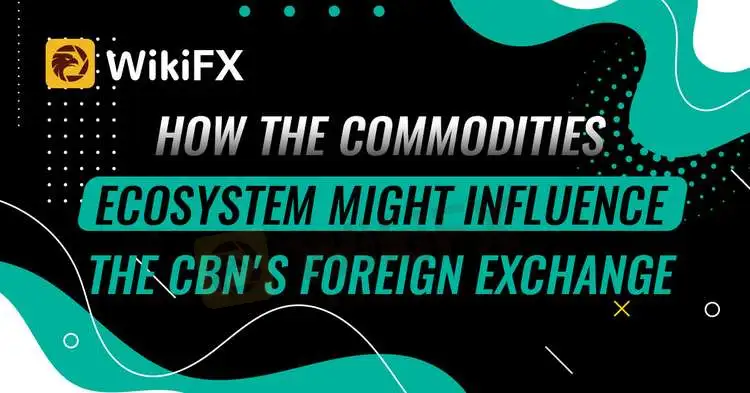简体中文
繁體中文
English
Pусский
日本語
ภาษาไทย
Tiếng Việt
Bahasa Indonesia
Español
हिन्दी
Filippiiniläinen
Français
Deutsch
Português
Türkçe
한국어
العربية
HOW THE COMMODITIES ECOSYSTEM MIGHT INFLUENCE THE CBN'S FOREIGN EXCHANGE POLICY
Abstract:Bankers and other financial market participants in Nigeria have highlighted commodity ecosystem deployment as a mechanism for the Central Bank of Nigeria (CBN) to meet its objective to earn up to $200 billion yearly from non-oil exports over the next three to five years under its RT 200 FX policy.

Bankers and other financial market participants in Nigeria have highlighted commodity ecosystem deployment as a mechanism for the Central Bank of Nigeria (CBN) to meet its objective to earn up to $200 billion yearly from non-oil exports over the next three to five years under its RT 200 FX policy.
The stakeholders who assembled at a breakfast meeting organized by the Lagos Commodities and Futures Exchange (LCFE) over the weekend agreed that the proper use of Nigeria's commodities ecosystem provides the abundant potential for the apex bank to produce currency from non-oil exports.
Olugbenga Awe, Divisional Head, Agribusiness, Natural Resources, and Project Development at Heritage Bank, highlighted in his presentation that the Nigerian economy had been well-diversified, except for the sources of forex.
According to Awe, who spoke at the 'The Opportunities for Financial Institutions in the CBN RT 200 FX' event, a commodities exchange is a risk management tool.
According to him, the capacity to match global standards and demand is the most difficult hurdle facing Nigerian non-oil product exports. He noted that if Nigerian non-oil products satisfy global standards, they might improve foreign profits.
“This is where commodity exchanges come into play.” Any product with an electronic receipt that is exchanged on a commodities market must be of global quality.
“Banks are prepared to assist exporters if they satisfy specific requirements, such as a track record of success, export volume and frequency, payment methods, product sourcing strategy, risk mitigation, and seasonality, among others.”

Bode Abikoye, Managing Director of Agvest Nigeria, agreed, noting that commodity prices provide insulation from the consequences of inflation.
“Many experts advocate investing a portion of your portfolio in commodities as a diversifier asset class.”
Furthermore, some commodities, such as precious metals and energy items, tend to be ideal inflation hedges.
Investors divide commodities into two types: hard and soft. Metals such as gold, copper, and aluminum, as well as energy goods such as crude oil, natural gas, and unleaded gasoline, need mining or drilling.
“Soft commodities” are agricultural products such as maize, wheat, soybeans, and livestock. Commodities have a low to negative correlation with traditional asset classes such as equities and bonds.
“The major reason commodities prices fluctuate is due to supply-and-demand dynamics.” When a crop has a large harvest, its price normally falls, but drought circumstances might cause prices to climb due to worries that future supplies would be fewer than predicted, Abikoye explained.
Hajara Adeola, Chief Executive Officer of Lotus Capital, explained in her presentation on 'The Potentials of Non-Interest Financial Instruments to Finance Commodities Ecosystem' that non-interest financial instruments were based on managing businesses on moral principles, and that they offer many benefits to investors.
Akin Akeredolu-Ale, Managing Director of LCFE, explained in his welcome remarks that a commodities exchange would always come in by catalyzing an enabling environment, alignment of relevant stakeholders, a transparent trading platform, certification and standardization, data and price discovery, an enabling environment for price discovery, and a regulatory framework.

Disclaimer:
The views in this article only represent the author's personal views, and do not constitute investment advice on this platform. This platform does not guarantee the accuracy, completeness and timeliness of the information in the article, and will not be liable for any loss caused by the use of or reliance on the information in the article.
Related broker
Read more

How to Know if the Market is Correcting or Reversing?
In trading, distinguishing between a market correction and a market reversal is crucial for making sound decisions. Misjudging one for the other can lead to missed opportunities or significant losses. While both involve price movements, their causes, duration, and implications differ substantially. Understanding these differences can help traders improve their strategies and adapt to market conditions effectively.

Empowering the Next Generation in Finance with WikiFX: Gen Z’s Investment Journey
With a steadfast commitment to fostering sustainable financial literacy and providing clear, strategic guidance to the next generation, WikiFX has collaborated with Van Lang University and Hoa Sen University to host an exclusive series of financial education workshops. This marks a pioneering initiative by WikiFX in Vietnam, designed not only to deliver foundational knowledge but also to instill a sense of responsibility and cultivate prudent financial decision-making among aspiring young traders.

What Impact Does Japan’s Positive Output Gap Have on the Yen?
The Japanese government has announced that, due to a tight labor market, the country’s economic output is expected to return to full capacity in the next fiscal year for the first time in seven years.

WikiFX Review: Is Ultima Markets Legit?
Ultima Markets has played a significant role in the forex trading industry for decades. WikiFX created a comprehensive review to help you better understand this broker. We will analyze its reliability based on specific information, regulations, etc. Let’s get into it.
WikiFX Broker
Latest News
Why is there so much exposure against PrimeX Capital?
Russia to Fully Ban Crypto Mining in 10 Regions Starting January 1, 2025
Two Californians Indicted for $22 Million Crypto and NFT Fraud
Macro Markets: Is It Worth Your Investment?
WikiFX Review: Is Ultima Markets Legit?
Colorado Duo Accused of $8M Investment Fraud Scheme
What Impact Does Japan’s Positive Output Gap Have on the Yen?
RM62k Lost Investment Scam After Joining XRP Community Malaysia on Telegram
Victims of Financial Fraud in France Suffer Annual Losses of at Least €500 Million
SEC Warns on Advance Fee Loan Scams in the Philippines
Currency Calculator


